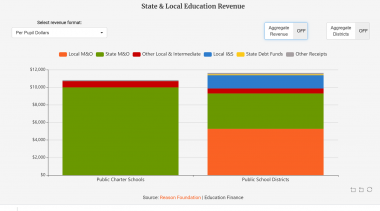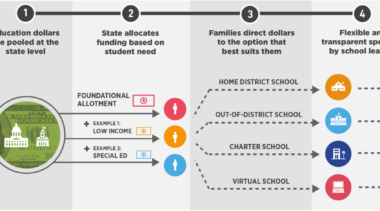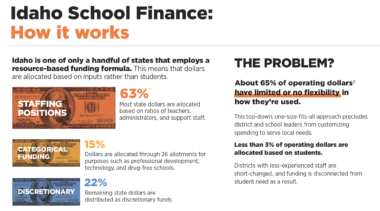Aaron Garth Smith is the director of education reform at Reason Foundation.
Smith works extensively on education finance policy and his writing has appeared in dozens of outlets including National Review, The Hill, and Education Week.
Smith graduated from the University of Maine with a bachelor's degree in business administration and earned a Master of Business Administration from Texas A&M University.
He is based in Phoenix, Arizona.
-
Analysis of Texas School District Open Enrollment Data
Three percent of Texas students transferred to a traditional public school outside of their assigned school district in the 2018-2019 school year.
-
Do Texas Charter Schools Receive More Funding Than the State’s School Districts?
Charter schools receive about $813 less per pupil on average than traditional public schools, a discrepancy that is driven by facilities funding.
-
How Should States Count Students to Calculate School Funding?
School finance systems should base education funding on current enrollment figures to best serve students and promote equity.
-
Examining Legislation to Expand Open Enrollment in Arizona
Arizona lawmakers are looking to remove barriers preventing public school students from attending a school outside of their residentially assigned school district as well as more easily find transportation to their school of choice.
-
Infographic: Texas Charter Funding Gap
Public charter schools in Texas receive an average of 7 percent less education funding than the state's public school districts.
-
Examining Student Funding in Texas Charter Schools and Traditional Public Schools
Texas students who choose to attend a charter school receive $813 fewer dollars, on average, compared to peers in traditional public schools.
-
Fiscal Explainer: Texas Charter School Funding Analysis
Between 2015 and 2019, the inflation-adjusted funding gap between public charter schools and traditional public schools grew by about 36 percent—from $596 per pupil to $813 per pupil.
-
Modernizing School Finance in Idaho
This policy brief provides a brief overview of Idaho’s school finance system, highlights its primary shortcomings, and makes several recommendations for reform.
-
Infographic: How Student-Centered Funding Works and How to Get There
How policymakers can align education funding with students' needs.
-
Inform: Give Stakeholders The Information They Need to Make Sound Education Funding Decisions
Financial transparency can help leaders get the most out of education dollars while shining light on their spending decisions.
-
Empower: How to Put Families and School Leaders in the Driver’s Seat
Policymakers should let those who are closest to kids decide how education dollars are spent, and families should be given options outside of their residentially-assigned public schools.
-
Equalize: Education Funding Policies That Put All Kids on a Level Playing Field
Education dollars should be equalized to ensure that funding is based on students, not property wealth or zip code.
-
Streamline: How to Allocate Education Dollars Strategically
Education dollars should be allocated based on students’ needs using a weighted-student formula so that funding is fair, portable, and transparent.
-
A Student-Centered Funding Roadmap for Policymakers
Student-centered funding models treat every child more fairly, better recognize individuality, and allow for innovation and progress.
-
Planning For Potential Budget Cutbacks In Michigan: Sustainable School Finance Solutions
Even in a constrained fiscal environment, Michigan can improve education funding equity and better empower local school leaders.
-
Three Things Policymakers Can Do to Improve School Finance Systems Right Now
There are practical and prudent steps policymakers can take to help schools support kids in the coming school year.
-
Infographic — Idaho School Finance: How It Works and How to Improve the System
Idaho should streamline its education funding system into a weighted-student formula that allocates dollars based on local students' needs.
-
Education Newsletter: School Finance During the COVID-19 Pandemic
Plus: Families considering homeschooling have a variety of options and curriculum choices, targeting education funding to disadvantaged students, and more.


















